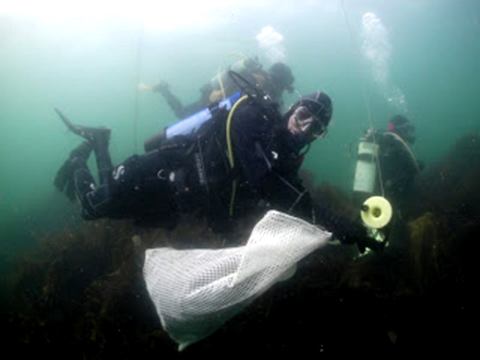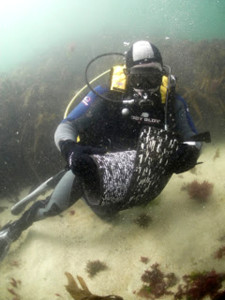Marine Life & Conservation
Underwater Litter Picking In Cornwall

Litter is the outward sign of a lazy individual or community. Discarding litter shows total disregard for other people and the environment. As well as being unsightly it is causing havoc in the marine world. Animals are caught up in it, others feed on it only to die of starvation and poisoning. We have got to the stage where seeing discarded drink cans, plastic and other waste products are part of normal life.
Mark Milburn of Atlantic Divers in Falmouth Cornwall decided to do something about it. Each month Mark heads an underwater litter pick at different locations around the Falmouth area. I asked him how it all got started.
“Early in 2012, a few of my past students had contacted me; they had been struggling to find buddies to dive with. I decided to organise a social dive which I advertised on Facebook. Quite a few locals turned up as well as some of my past students. It was quite effective. I then made the decision to organise these social dives once a month, to give everyone a chance to get to know each other at their leisure.
During an escorted dive in June of 2012, while I was showing someone the delights of some of Falmouth’s shore dives, I noticed quite a bit of litter underwater at Swanpool Beach. I hadn’t realised that there was much before; was this new, or were my eyes now open? I almost felt ashamed, so darted about picking up carrier bags and shoving them in my drysuit pockets. The person I was escorting enjoyed the dive and was impressed with my litter collection. I thought to myself “I need to clean this up”. It would be a huge task but worth it. Later that evening I was wondering where to do the next social dive, Swanpool wasn’t the most exciting of dives, just easy and quite pleasant. Then it clicked, combine the two, a social dive to collect litter.
We set a date for August, a Sunday lunchtime so everyone could have their ‘lie in’. The owner of Swanpool was helpful and organised a press release. We received a call from BBC Radio Cornwall, asking if we could be interviewed on the Saturday. When we arrived on the Saturday morning for the interview, there were huge waves crashing into Swanpool Beach. Sunday’s weather forecast was good but this wasn’t ideal conditions for the day before.
It was Sunday, 12 noon, and there were quite a few divers in the car park. Some I had never met before, some I had known for years. I gave the pre-dive brief, explained what we were doing, what was expected, what we could collect and what we shouldn’t. I had used the Project Aware site’s litter picker’s guide for the Dos and Don’ts. Luckily the weather forecast was correct and the sea was flat, although the visibility didn’t look too clever. The divers entered the water as and when they were ready, after being pestered by Julie for their details for her diver’s log. As the divers floated off there were several shouts about the visibility, it wasn’t good. I just shouted to go out further.
An hour and a half later, all the divers were back out. There was a pile of litter to be sorted and categorized, before submitting to Project Aware. The litter pick had also coincided with BSAC’s litter picking effort, so we sent them the data too. We had collected 16kg’s of litter of varying types and everyone had enjoyed themselves, so it was well worth the effort.
[youtube id=”9dbrD-pcEgk” width=”100%” height=”300px”]
It was then decided to turn this into a monthly event. The next month we went to Gyllyngvase Beach and did the same thing, and I filmed some of it. One of the divers was actually a BBC reporter, and he liked the footage so much that he showed his boss. It was then shown to BBC TV who liked it and combined the litter picking story with a camera I had found six weeks prior to the litter pick. This is the story that did the rounds.
 The following month we went to Castle Beach, in some rather inclement conditions. We had spoken with some locals who regularly cleaned the beaches; they did a surface pick while we went underwater.
The following month we went to Castle Beach, in some rather inclement conditions. We had spoken with some locals who regularly cleaned the beaches; they did a surface pick while we went underwater.
Pendennis headland was our next target, our best turn-out so far, with 15 divers collecting rubbish.
Over the past few months I had been in contact with Beach Care, part of Keep Britain Tidy – they organise beach litter picks around Devon and Cornwall. We had arranged a combined event with Tremough (Falmouth University), where there would be both surface and underwater litter collections. Nineteen divers in all went in, a split of half locals and half students.
Our last litter pick of 2012 was conducted back at Swanpool. There was litter there but not in the quantity we had found originally, we had made a difference.
During the start of 2013, the combined easterly winds and freezing conditions caused us to take a break from litter collection. By May the water temperature still hadn’t really increased but we decided to have a go. The plan for this year is to keep up with the monthly picks but also to try and get people to pick litter during social dives. The first social dive at Gyllyngvase proved mildly successful; it gives us a base to work on though.
Blogs
Invitation from The Ocean Cleanup for San Francisco port call

6 years ago, The Ocean Cleanup set sail for the Great Pacific Garbage Patch with one goal: to develop the technology to be able to relegate the patch to the history books. On 6 September 2024, The Ocean Cleanup fleet returns to San Francisco bringing with it System 03 to announce the next phase of the cleanup of the Great Pacific Garbage Patch and to offer you a chance to view our cleanup system up-close and personal.
We look forward to seeing you there.
To confirm your presence, please RSVP to press@theoceancleanup.com
PROGRAM
Join The Ocean Cleanup as our two iconic ships and the extraction System 03 return to San Francisco, 6 years and over 100 extractions after we set sail, to create and validate the technology needed to rid the oceans of plastic.
Our founder and CEO, Boyan Slat, will announce the next steps for the cleanup of the Great Pacific Garbage Patch. Giving you a chance to view our cleanup system and the plastic extracted.
Hear important news on what’s next in the mission of The Ocean Cleanup as it seeks to make its mission of ridding the world’s oceans of plastic an achievable and realistic goal.
Interviews and vessel tours are available on request.
PRACTICALITIES
Date: September 6, 2024
Press conference: 12 pm (noon)
Location: The Exploratorium (Google Maps)
Pier 15 (Embarcadero at Green Street), San Francisco, CA
Parking: Visit The Exploratorium’s website for details.
RSVP: press@theoceancleanup.com
Video & photo material from several viewing spots around the bay
We look forward to seeing you there!
ABOUT THE OCEAN CLEANUP
The Ocean Cleanup is an international non-profit that develops and scales technologies to rid the world’s oceans of plastic. They aim to achieve this goal through a dual strategy: intercepting in rivers to stop the flow and cleaning up what has already accumulated in the ocean. For the latter, The Ocean Cleanup develops and deploys large-scale systems to efficiently concentrate the plastic for periodic removal. This plastic is tracked and traced to certify claims of origin when recycling it into new products. To curb the tide via rivers, The Ocean Cleanup has developed Interceptor™ Solutions to halt and extract riverine plastic before it reaches the ocean. As of June 2024, the non-profit has collected over 12 million kilograms (26.4 million pounds) of plastic from aquatic ecosystems around the world. Founded in 2013 by Boyan Slat, The Ocean Cleanup now employs a broadly multi-disciplined team of approximately 140. The foundation is headquartered in Rotterdam, the Netherlands, and opened its first regional office in Kuala Lumpur, Malaysia, in 2023.
Find out more about The Ocean Cleanup at www.theoceancleanup.com.
Marine Life & Conservation
SHARK MONTH ARRIVES AT ROYAL WILLIAM YARD, PLYMOUTH

A shark has been spotted approaching Royal William Yard in Plymouth, much to the surprise of swimmers, paddleboarders and onlookers.
With its distinctive dorsal fin cutting through the water, the sizeable shark swam along the coastline, before turning to head inland towards Firestone Arch at Royal William Yard. The appearance drew a crowd, who were captivated for more than an hour by the unusual sight – and it was all caught on video.
The shark is one of many expected sightings at Royal William Yard over the coming weeks… because today marks the start of Shark Month!
In reality, the ‘shark’ spotted along the Plymouth shoreline was actually a custom-made model, created by the team at Royal William Yard and sailed underwater by Caroline Robertson‑Brown from the Shark Trust, who donned scuba diving gear for the occasion.
The stunt took place to launch Shark Month in style and draw attention to the work of the leading international conservation charity, which is based in Britain’s Ocean City. Spectators were reassured that the water was safe and many entered into the spirit of the performance, swimming or sailing alongside the shark.
Shark Month will take place across Royal William Yard throughout July and will feature an extravaganza of art, entertainment and advocacy for everyone to enjoy. The packed programme of events starts with an art exhibition and ends with a trip on paddleboards with shark experts – with everything from a shark quiz to a Jaws screening in between.
Paul Cox, CEO of the Shark Trust, said: “There are often assumptions and misconceptions when it comes to sharks. This was certainly the case with the shark spotted at Royal William Yard! While the British coastline is home to many species of shark, this was not one of them. However, we’re thrilled it caught people’s attention, because seeing a shark is a special and memorable moment. That is precisely why we want to celebrate these incredible creatures, highlight the need for conservation, and ask for help to safeguard their future.”
For more information about Shark Month at Royal William Yard, visit the Shark Trust Website.
Images and video: Jay Stone
-

 Blogs2 months ago
Blogs2 months agoDiving With… Nico, Ocean Earth Travels, Indonesia
-

 News1 month ago
News1 month agoMurex Bangka Announce New Oceanfront Cottages & Beachfront Dining
-

 Blogs2 months ago
Blogs2 months agoA new idea in freediving from RAID
-

 Marine Life & Conservation1 month ago
Marine Life & Conservation1 month agoIceland issue millionaire whale hunter a licence to murder 128 vulnerable fin whales
-

 Marine Life & Conservation2 months ago
Marine Life & Conservation2 months agoThe Shark Trust Great Shark Snapshot is back
-

 News3 months ago
News3 months agoCharting New Waters; NovoScuba Goes Global with the Launch of their Revolutionary Dive Training Agency!
-

 Gear News1 month ago
Gear News1 month agoNew Suunto Ocean – a dive computer and GPS sports watch in one for adventures below and above the surface
-

 Marine Life & Conservation Blogs2 months ago
Marine Life & Conservation Blogs2 months agoBook Review: Plankton
















